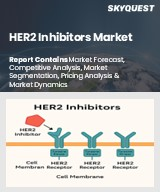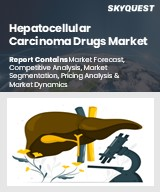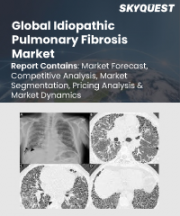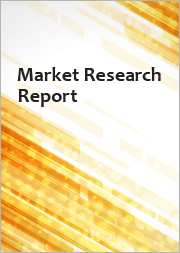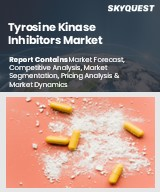
|
시장보고서
상품코드
1855025
역형성 림프종 키나아제(ALK) 억제제 시장 - 표적 인구, 경쟁 구도, 시장 예측(2034년)Anaplastic Lymphoma Kinase (ALK) inhibitors - Target Population, Competitive Landscape, and Market Forecast - 2034 |
||||||
주요 하이라이트
- ALK 억제제는 ALK 양성 암(NSCLC 및 ALCL)의 종양 성장과 생존을 촉진하는 ALK 융합 단백질의 활성을 억제합니다. 근본적인 유전자 동인을 직접 표적으로 삼아 암세포의 증식을 막고 종양의 퇴행을 촉진합니다. 이 정밀한 접근 방식은 표준 화학요법과는 다른 방식으로 효능을 개선하고 안전성 프로파일을 개선하는 데 도움을 줍니다.
- 12인사이트는 2024년 주요 7개국의 각 적응증에서 ALK 억제제의 총 적응증 환자 수를 약 2만 9,500명으로 추산하며, ALK를 표적으로 하는 악성 종양 치료 기회의 크기, 정확한 바이오마커 식별중요성, 표적 치료 전략의 지속적인 확대를 강조하고 있습니다.
- DelveInsight의 2024년 분석에 따르면, 주요 7개국의 ALK 억제제 시장은 약 20억 달러 규모로 연평균 성장률(CAGR) 3.6%로 성장할 것으로 예상되며, 이는 정밀 종양학의 도입과 바이오마커 기반 치료에 대한 관심이 높아진 것을 반영합니다.
- ALK 양성 암 치료는 Roche의 ALECENSA(알렉티닙), Pfizer의 LORBRENA/LORVIQUA(로라티닙), Takeda의 ALUNBRIG(브리가티닙), Betta Pharmaceuticals/Xcovery의 ENSACOVE(안살티닙) 등 FDA(미국 식품의약국) 승인을 받은 표적 치료제가 출시되면서 큰 진전을 이루었습니다. 이들 약제는 기존 화학요법에 비해 지속적인 반응, 두개내 유효성, 내약성 및 내약성이 개선되어 환자 치료에 변화를 가져왔습니다.
- ALK 양성 암에 대한 파이프라인은 아직 제한적이며, 개발 중인 새로운 치료제는 거의 없습니다. 네라달키브(NVL-655)는 뉴발란트의 4세대 ALK 억제제로 1차 라인(1L) 및 2차 라인 이상(2L+) 모두에서 연구되고 있습니다. 몇 안 되는 발전 후보 중 하나이지만, 광범위한 혁신의 부족은 미래의 치료 옵션에 분명한 격차를 남기고 있습니다.
DelveInsight의 "역형성 림프종 키나아제(ALK) 억제제 세계 시장 - 표적 인구, 경쟁 구도, 시장 예측(2034년)" 보고서는 미국, EU 4개국(독일, 프랑스, 이탈리아, 스페인), 영국, 일본의 ALK 억제제, 과거 및 예측 역학 데이터, 경쟁 상황, ALK 억제제 시장 동향을 상세히 파악할 수 있습니다.
ALK 억제제 시장 보고서는 현재 치료법, 신약, 개별 치료제의 시장 점유율, 2020년에서 2034년까지 주요 7개국 ALK 억제제 시장 규모 현황 및 예측을 제공합니다. 또한, ALK 억제제의 새로운 치료법/알고리즘 및 미충족 의료 수요를 포괄하여 최적의 치료 기회를 발굴하고 시장 잠재력을 평가합니다.
대상 지역
- 미국
- EU 4개국(독일, 프랑스, 이탈리아, 스페인) 및 영국
- 일본
역형성 림프종 키나아제(ALK) 억제제에 대한 이해와 치료 알고리즘
역형성 림프종 키나아제(ALK) 억제제 개요
ALK 억제제는 비소세포폐암(NSCLC) 및 미분화대세포림프종(ALCL)의 주요 암 유발 인자인 ALK 융합단백질의 활성을 억제하는 정밀의약품입니다. 이 비정상적인 신호전달 경로를 직접 표적으로 삼아 종양의 성장을 억제하고 퇴행을 유도하여 기존 화학요법에 비해 생존율을 크게 향상시킬 수 있습니다.
역대 ALK 억제제는 내성 돌연변이 및 뇌 전이 등의 문제를 해결하도록 설계되어 보다 지속적인 반응과 광범위한 임상적 혜택을 가능하게 했습니다. ALK 억제제는 표적 메커니즘, 우수한 안전성 프로파일, 질병 진행을 극복할 수 있는 능력으로 ALK 양성 암의 획기적인 치료제로 자리매김하고 있습니다.
역형성 림프종 키나아제(ALK) 치료제
ALK 억제제는 비소세포폐암과 ALCL에서 종양 성장과 생존의 중요한 촉진인자인 ALK 재배열의 활성을 억제하는 표적 치료제입니다. 이 약제들은 통제할 수 없는 암세포의 증식과 질병 진행을 촉진하는 ALK 신호전달을 선택적으로 억제하도록 설계되었습니다. 이 발암 촉진 인자를 표적으로 삼아 ALK 억제제는 종양의 성장을 억제하고 종양의 퇴행을 유도합니다.
비소세포폐암과 ALCL에서 ALK 억제제는 뇌 전이 및 내성 변이에 관여하는 경로를 포함하여 암세포를 유지하는 비정상적인 신호전달 경로를 직접적으로 억제하는 방식으로 작용합니다. 질병의 근본적인 유전적 원인을 해결함으로써 단순히 증상 완화뿐만 아니라, 기존 화학요법 대비 지속적인 반응과 결과 개선을 가져오는 정밀한 질병 변형 접근법을 제공합니다.
역형성 림프종 키나아제(ALK) 억제제의 역학
본 보고서의 ALK 억제제 역학 장에서는 2020년부터 2034년까지 미국, EU 4개국(독일, 프랑스, 이탈리아, 스페인), 영국, 일본 등 주요 7개국에서 각 적응증별 ALK 억제제 대상 환자 수와 각 적응증별 ALK 억제제 총 치료 건수를 과거 및 예측했습니다. 를 역학적으로 과거 및 예측했습니다.
- 12인사이트는 2024년 미국 내 ALK+NSCLC 환자 약 10,000명, ALK+ALCL 환자 약 1,750명이 ALK 억제제의 적응증이 될 것으로 추정하며, 두 적응증의 임상적 연관성과 표적 치료제 채택을 촉진하는 데 있어 미국에서의 중요성을 강조합니다.
- 2024년 EU 4개국과 영국에서 ALK+NSCLC의 우발적 발병 건수는 독일이 2,700건으로 가장 많았고, 영국이 2,200건, 스페인이 1,300건으로 가장 적었습니다. 이는 ALK 양성 비소세포폐암의 지역적 분포를 강조하고, 이들 시장에서 표적 치료제 도입의 중요성을 강조하고 있습니다.
- 2024년 일본에서는 ALK+ALCL의 총 환자 수가 약 500명에 달할 것으로 예상되며, 이 희귀한 적응증에 대한 일본의 임상적 부담과 표적 치료 개입의 필요성이 부각되고 있습니다.
역형성 림프종 키나아제(ALK) 억제제 약물 장
ALK 억제제 보고서의 약물 장에서는 ALK 억제제의 후기 단계(3상 및 1상) 및 초기 단계의 파이프라인 약물에 대한 상세한 분석이 포함되어 있습니다. 또한, ALK 억제제의 임상시험 세부 사항, 표현력이 풍부한 약리 작용, 계약 및 제휴, 승인 및 특허 세부 사항, 포함된 각 약물의 장단점, 최신 뉴스 및 보도자료를 이해하는 데 도움이 될 것입니다.
판매되고 있는 약품
ENSACOVE(안살티닙) : 베타 파마슈티컬스/엑스커버리(Betta Pharmaceuticals/Xcovery)
ENSACOVE(안살티닙)는 Betta Pharmaceuticals/Xcovery가 개발 중인 경구용 저분자 차세대 ALK 억제제로, 뇌 전이 및 내성 돌연변이 환자를 포함한 ALK 양성 비소세포폐암 및 ALCL 치료제입니다.
- 2024년 12월 미국 FDA는 ALK 억제제 투여 경험이 없는 ALK 양성 국소 진행성 또는 전이성 비소세포폐암 성인 환자를 대상으로 ENSACOVE를 승인했습니다.
- 2024년 3월, 미국 FDA는 전이성 ALK 양성 비소세포폐암 성인 환자를 대상으로 1L 설정에서 크리조티닙과 효능 및 안전성을 비교한 임상 3상 eXalt3 시험에 근거하여 안살티닙의 신약허가신청(NDA)을 승인했습니다.
ALUNBRIG(브리가티닙) : Takeda
다케다의 알룬브릭(ALUNBRIG, 성분명: 브리가티닙)은 ALK 양성 비소세포폐암 및 ALCL 환자의 예후 개선을 목표로 하는 차세대 ALK 억제제입니다. ALK 유전자 재배열을 선택적으로 억제하여 종양 세포의 증식과 생존을 억제하고, 내성 돌연변이 및 두개 내 병변에 대응하여 환자의 반응과 병세 조절을 개선합니다. 이 치료제는 크리조티닙 치료 경험이 있는 ALK 양성 진행성 및 전이성 비소세포폐암 환자를 대상으로 1L, 2L 이상 투여 시 승인됐습니다.
- 2020년 5월, 다케다는 미국 FDA가 ALK 양성 전이성 비소세포폐암 성인 환자를 대상으로 ALUNBRIG를 FDA 승인 검사에서 검출된 ALK 양성 전이성 비소세포폐암 환자를 대상으로 승인했다고 보고했습니다. 이번 승인으로 알룬브릭의 현재 적응증은 1L로 확대됩니다.
- 2020년 4월, 유럽위원회(EC)로부터 ALK 억제제 치료 경험이 없는 ALK 양성 진행성 비소세포폐암 성인 환자 대상 ALK 양성 진행성 비소세포폐암에 대한 단독요법으로 알룬브릭의 판매 허가를 연장한다는 통보를 받았습니다.
- 2021년 1월, 절제 불가능한 진행성 및 재발성 ALK 융합 유전자 양성 비소세포폐암 환자를 위한 1L 및 2L 치료제로 알룬브릭정 30mg 및 90mg의 제조판매허가를 획득했습니다.
ALECENSA(알렉티닙) : Roche
Roche의 ALECENSA(알렉티닙)는 ALK 양성 비소세포폐암 및 ALCL에서 종양의 성장과 생존을 촉진하는 ALK 재조합을 표적으로 하는 차세대 ALK 억제제입니다. 이미 여러 적응증으로 승인된 이 약은 강력한 전신 및 두개내 활성과 안전성 프로파일이 충분히 확인되어 임상 적용 확대를 위한 추가 검토가 진행되고 있습니다. 이 치료제는 미국, 유럽, 일본에서 수술 후 보조요법, 1L 요법, 2L 요법 및 그 이상의 치료 등 다양한 치료 적응증으로 승인됐습니다.
- 중외제약은 2024년 8월 일본 후생노동성으로부터 ALK 융합 유전자 양성 비소세포폐암에 대한 수술 후 보조요법 적응증 추가를 승인받았다고 보고했습니다. 알레센서의 승인 신청은 2023년 12월입니다.
- 2024년 6월, 유럽연합 집행위원회(EC)는 재발 위험이 높은 ALK 양성 비소세포폐암(stage IB[=4cm]-IIIA 비소세포폐암) 성인 환자의 종양 절제술 후 수술 후 보조요법으로 알레센자 단독요법을 승인했습니다.
- 2024년 4월, 미국 FDA는 ALK 양성 비소세포폐암 환자의 종양 절제 후 수술 후 보조요법으로 FDA가 승인한 검사에서 검출된 ALK 양성 비소세포폐암 환자를 대상으로 알레센서를 승인했습니다.
신약
네라달키브(NVL-655) : Nuvalent
네라달키브(NVL-655)는 뉴발란트가 개발 중인 경구용 저분자 4세대 ALK 억제제로, 내성 돌연변이 종양 및 뇌전이 환자를 포함한 ALK 양성 비소세포폐암 및 ALCL 치료제입니다. 이전 세대의 ALK 억제제의 한계를 극복하기 위해 설계된 넬라달팁은 강력한 전신 및 두개내 활성을 나타내며, ALK 유도성 진행성 암 환자에서 지속적인 반응을 보이는 것을 목표로 합니다. 이 치료제는 1L 치료 대상의 임상 3상 ALKAZAR 시험과 2L 이상 치료 대상의 임상 I/II상 ALKOVE-1 시험에서 평가 중이며, 2025년 하반기에는 TKI 전 치료 ALK+NSCLC 환자를 대상으로 한 ALKOVE-1 시험의 중요한 탑라인 결과가 나올 예정입니다. 나올 예정입니다.
- 2025년 7월, 뉴발란트는 TKI 미치료 ALK 양성 비소세포폐암 환자를 대상으로 네라달키브(NVL-655)를 평가하는 ALKAZAR 임상 3상 무작위 대조군 시험의 시작을 보고했습니다.
- 2024년 5월, 뉴발란트는 미국 FDA가 NVL-655에 대해 2가지 이상의 ALK TKI별 이전 치료 경험이 있는 국소 진행성 또는 전이성 ALK 양성 비소세포폐암 환자를 대상으로 안전성과 유효성에 대한 초기 임상적 근거를 바탕으로 획기적 치료제 지정(Breakthrough Therapy Designation: BTD)을 부여했다고 보고했습니다. Breakthrough Therapy Designation: BTD)를 부여했다고 보고했습니다. FDA는 또한 ALK 양성 비소세포폐암에 대한 NVL-655의 희귀의약품 지정(ODD)을 승인했습니다.
역형성 림프종 키나아제(ALK) 억제제 시장 전망
ALK 억제제 시장은 ALK 양성 비소세포폐암 및 ALCL의 발병률 증가, 표적 치료의 임상적 유용성에 대한 인식 증가, 차세대 및 4세대 ALK 억제제의 등장, 대형 제약사들의 지속적인 투자 등으로 향후 몇 년 동안 크게 성장할 것으로 예상됩니다.
ALK 억제제는 종양 성장과 생존의 중요한 원동력인 ALK 재조합을 선택적으로 표적하는 획기적인 치료제입니다. 미충족 수요와 ALCL에서 이들 약물은 종양 성장을 억제할 뿐만 아니라 강력한 두개 내 활성을 보여 뇌 전이 및 내성 변이를 가진 환자에서 높은 미충족 수요를 충족시키고 있습니다. 네라달키브(NVL-655)와 같은 새로운 화합물은 이전 치료 경험이 많은 환자에서도 전신 및 두개골 내에서 지속적인 반응을 보여 이전 세대의 치료법의 한계를 극복할 수 있도록 설계되었습니다.
ALK 억제제는 분자 수준에서 발암 동인을 표적화함으로써 기존 화학요법 대비 정밀하고 질병을 조절하는 효과를 가져와 ALK 구동형 암 환자의 예후와 삶의 질을 개선합니다. 현재 진행 중인 임상시험과 규제 마일스톤을 통해 치료 옵션은 계속 확대되고 있으며, ALK 억제제가 ALK 양성 악성 종양 치료의 초석으로 자리매김할 수 있을 것으로 예상됩니다.
- 주요 7개국의 ALK 억제제 시장 규모는 2024년 약 20억 달러로 예측 기간(2025-2034년) 동안 확대될 것으로 예상됩니다.
- 미국 내 ALK 억제제 시장 규모는 2024년 10억 달러 이상이며, 새로운 치료제의 출시로 인해 증가할 것으로 예상됩니다.
- EU 4개국과 영국의 총 시장 규모는 2024년 약 4억 5,000만 달러로 계산되며, 주요 7개국 총 시장 수익의 22%에 육박하고, 2034년까지 증가할 것으로 예상됩니다.
- 2024년에는 독일이 EU 4개국과 영국 사이의 시장을 독점하여 1억 1,000만 달러 이상을 벌어들였습니다. 영국이 약 9,000만 달러로 근소한 차이로 뒤를 이었고, 스페인이 약 6,000만 달러를 기록했습니다.
- 2024년 일본 ALK 억제제의 총 시장 규모는 약 3억 4,000만 달러이며, 예측 기간(2025-2034년) 동안 확대될 것으로 예상됩니다.
역형성 림프종 키나아제(ALK) 억제제의 보급률
이 섹션에서는 2020-2034년 사이에 시장에 출시될 것으로 예상되는 잠재적인 신흥 ALK 억제제의 시장 진입률에 초점을 맞추고 있습니다.
역형성 림프종 키나아제(ALK) 억제제 파이프라인 개발 활동
이 보고서는 등록 전, 임상 3상 및 초기 단계의 다양한 치료제 후보물질에 대한 인사이트를 제공합니다. 또한, 표적 치료제 개발에 참여하는 주요 기업들에 대해서도 분석합니다.
다양한 단계에 있는 수많은 약물의 존재는 예측 기간 동안 ALK 억제제 시장의 성장에 엄청난 기회를 창출할 것으로 예상됩니다.
파이프라인 개발 활동
본 보고서에서는 ALK 억제제 신약의 공동 연구, 인수합병, 라이선싱, 특허에 대한 정보를 상세히 다루고 있습니다.
KOL의 견해
현재와 향후 시장 동향을 파악하기 위해 데이터 격차를 메우고 2차 조사를 검증하기 위해 1차 조사를 통해 이 분야에서 활동하는 업계 전문가들의 의견을 반영하고 있습니다. ALK 억제제의 진화하는 치료 환경, 기존 치료제에 대한 환자의 의존도, 환자의 치료 전환 수용성, 약물 수용성, 접근성 문제 등에 대한 인사이트를 얻기 위해 업계 상황에 정통한 전문가들과 접촉했습니다.
의사의 견해
미국 KOL에 따르면, "ALK 양성 폐암은 비편평상피세포폐암의 극히 일부이며, 가이드라인에서는 비편평상피세포폐암의 진행성 환자에서 일상적인 검사를 권장하고 있다"고 말했습니다. ALK 억제제는 수술 후 보조요법으로 알렉티닙은 항암화학요법을 병용하거나 병용하지 않더라도 절제된 조기 병변에도 권고되고 있습니다.
영국 KOL에 따르면, "문제는 크리조티닙보다 우수한 효능과 내약성을 보일 뿐만 아니라 뇌전이 환자에서 생존 우위를 나타낼 수 있는 가능성을 보여주었으며, ALK 양성 비소세포폐암에서 여전히 중요한 과제인 전신질환과 중추신경계 질환 모두에 대응할 수 있는 능력을 강조하고 있습니다. "고 말했습니다. 이는 향후 치료 전략을 수립하는 데 있어 중추신경계에 작용하는 치료법의 중요성을 강조하고 있습니다."
일본 KOL에 따르면, "중추신경계 전이와 후천적 내성은 ALK 양성 진행성 비소세포폐암에서 여전히 큰 문제입니다. 네트워크 메타분석에 따르면, 3세대 ALK 억제제가 무진행 생존기간 연장에 있어 가장 큰 혜택을 제공하지만, 개별 약물 간의 중추신경계 활성의 효과 차이는 그다지 크지 않을 수 있습니다. 이러한 연구 결과는 맞춤형 치료 전략 개발에서 세대 및 약물 선택의 중요성을 강조하며, 중추신경계 병변 환자의 치료 결과를 최적화하기 위해 현재 진행 중인 중개 및 임상 연구를 뒷받침합니다.
정성 분석
당사는 SWOT 분석 등 다양한 접근법을 통해 정성적, 시장 인텔리전스 분석을 수행하고 있습니다. SWOT 분석에서는 질병 진단, 환자 인지도, 환자 부담, 경쟁 상황, 비용 효율성, 치료제의 지역적 접근성 등의 관점에서 강점, 약점, 기회, 위협을 제공합니다. 이러한 지적은 환자 부담, 비용 분석, 기존 및 개발 중인 치료 현황에 대한 분석가의 재량과 평가에 근거한 것입니다.
시장 진입 및 상환
ALK 억제제의 급여화는 미국에서는 이미 잘 확립되어 있으며, 유럽에서도 꾸준히 확대되고 있습니다. 각 제조사들은 보험에 가입하지 않았거나 보험에 가입되어 있지 않은 환자들에게 무료 또는 할인된 가격으로 이용할 수 있는 환자 지원 프로그램을 제공하고 있습니다. 이 프로그램들은 본인부담금을 크게 줄일 수 있지만, 환자는 여전히 본인부담금, 면책금액, 진료비 등을 부담해야 합니다. 일반적으로 메디케이드, 메디케어, 기타 연방 또는 주정부 의료 프로그램에 의해 환급되는 청구는 제외됩니다. 미국에서는 알레센타(알렉티닙)의 프로그램으로 Genentech Oncology Co-pay Assistance Program, 독립적인 Co-pay Assistance Foundation, Genentech Patient Foundation이 있습니다. 대상 환자가 감면 또는 무료로 치료를 받을 수 있도록 지원하고 있습니다.
이 보고서에는 국가별 상환 및 접근성 현황, 비용효과성 평가, 환자 접근성 향상을 위한 환자 지원 이니셔티브, 정부 처방약 프로그램의 보험 적용에 대한 인사이트 등이 상세히 설명되어 있습니다.
역형성 림프종 키나아제(ALK) 억제제 보고서 인사이트
- ALK 억제제 타겟 환자군
- ALK 억제제 치료 접근법
- ALK 억제제 파이프라인 분석
- ALK 억제제 시장 규모 및 동향
- 기존 및 향후 시장 기회
역형성 림프종 키나아제(ALK) 억제제 보고서의 주요 강점
- 10년 후 예측
- 주요 7개국 대상
- 주요 경쟁 제품
- 속성 분석
- 약품 사용량 및 주요 시장 예측의 가정
역형성 림프종 키나아제(ALK) 억제제 보고서 평가
- 현재 치료 관행
- 미충족 수요
- 파이프라인 제품 프로파일
- 시장의 매력
- 정성 분석(SWOT)
목차
제1장 중요한 인사이트
제2장 보고서 소개
제3장 주요 요약
제4장 주요 사건
제5장 역학과 시장 예측 조사 방법
제6장 ALK 억제제 시장 개요
- 임상적 상황(분자 유형, 상, 투여 경로별 분석)
- 2024년 주요 7개국 시장의 치료제별 시장 점유율(%) 분포
- 2034년 주요 7개국 시장의 치료제별 시장 점유율(%) 분포
제7장 ALK 억제제 배경과 개요
- 소개
- 작용기전
- ALK 억제제의 가능성
- 부작용
- 현재 및 향후 ALK 억제제 요법
- 다양한 적응증의 ALK 억제제의 가능성
- 진단
제8장 역학과 환자 인구
- 주요 조사 결과
- 주요 7개국의 역학 시나리오
제9장 시판되고 있는 치료법
제10장 새로운 치료법
제11장 ALK 억제제 : 주요 7개국 시장 분석
- 주요 조사 결과
- 시장 전망
- 속성 분석
- 주요 시장 예측 가정
- 주요 7개국의 ALK 억제제 전체 시장 규모
- 주요 7개국의 ALK 억제제 시장 규모(치료별)
- 미국의 시장 규모
- EU 4개국과 영국의 시장 규모
- 일본 시장 규모
제12장 미충족 수요
제13장 SWOT 분석
제14장 주요 오피니언 리더의 견해
제15장 시장 접근과 상환
- 미국
- EU 4개국과 영국
- 일본
- ALK 억제제 시장 접근과 상환
제16장 부록
제17장 DelveInsight의 서비스 내용
제18장 면책사항
제19장 DelveInsight 소개
KSM 25.11.10Key Highlights:
- ALK inhibitors block the activity of the ALK fusion protein, which drives tumor growth and survival in ALK positive cancers (NSCLC and ALCL). By directly targeting the underlying genetic driver, they halt cancer cell proliferation and promote tumor regression. This precision approach distinguishes them from standard chemotherapy, offering improved efficacy and a more favorable safety profile.
- In 2024, DelveInsight estimated that the 7MM had nearly 29,500 patients comprising the total eligible patient pool for ALK inhibitors across respective indications, highlighting the substantial treatment opportunity, the importance of precise biomarker identification, and the continued expansion of targeted therapeutic strategies in ALK-driven malignancies.
- DelveInsight's 2024 analysis estimated the ALK inhibitor market across the 7MM at around USD 2 billion, growing at a Compound Annual Growth Rate (CAGR) of 3.6%, reflecting increasing uptake of precision oncology and greater emphasis on biomarker-driven treatments.
- The treatment landscape for ALK-positive cancers has significantly advanced with the availability of Food and Drug Administration (FDA) approved targeted therapies, including ALECENSA (alectinib) by Roche, LORBRENA/LORVIQUA (lorlatinib) by Pfizer, ALUNBRIG (brigatinib) by Takeda, and ENSACOVE (ensartinib) by Betta Pharmaceuticals/Xcovery. These agents have transformed patient care by delivering durable responses, strong intracranial efficacy, and improved tolerability over conventional chemotherapy.
- The pipeline for ALK-positive cancers remains limited, with very few emerging therapies in development. Neladalkib (NVL-655), a fourth-generation ALK inhibitor by Nuvalent which is being investigatd in both first-line (1L) and second-line and above (2L+) settings. It represents one of the few advancing candidates, while the lack of broader innovation leaves a clear gap in future treatment options.
DelveInsight's "Anaplastic Lymphoma Kinase (ALK) inhibitors" - Target Population, Competitive Landscape, and Market Forecast - 2034" report delivers an in-depth understanding of the ALK inhibitors, historical and projected epidemiological data, competitive landscape as well as ALK inhibitors market trends in the United States, EU4 (Germany, France, Italy, and Spain), the United Kingdom, and Japan.
The ALK inhibitors market report provides current treatment practices, emerging drugs, market share of individual therapies, and current and forecasted 7MM ALK inhibitor market size from 2020 to 2034. The report also covers emerging ALK inhibitors treatment practices/algorithms and unmet medical needs to curate the best opportunities and assess the market's potential.
Geography Covered:
- The United States
- EU4 (Germany, France, Italy, and Spain) and the United Kingdom
- Japan
Anaplastic Lymphoma Kinase (ALK) inhibitors Understanding and Treatment Algorithm
Anaplastic Lymphoma Kinase (ALK) inhibitors Overview
ALK inhibitors are precision medicines that block the activity of the ALK fusion protein, a key oncogenic driver in Non-Small Cell Lung Cancer (NSCLC) and Anaplastic Large Cell Lymphoma (ALCL). By directly targeting this abnormal signaling pathway, they suppress tumor growth, induce regression, and deliver meaningful improvements in survival compared with conventional chemotherapy.
Successive generations of ALK inhibitors have been designed to address challenges such as resistance mutations and brain metastases, enabling more durable responses and broader clinical benefit. Their targeted mechanism, favorable safety profile, and ability to overcome disease progression establish ALK inhibitors as a transformative class of therapies in ALK-positive cancers.
Anaplastic Lymphoma Kinase (ALK) Treatment
ALK inhibitors are a class of targeted therapies that block the activity of the ALK rearrangement, a key driver of tumor growth and survival in NSCLC and ALCL. These drugs are designed to selectively inhibit ALK signaling, which promotes uncontrolled cancer cell proliferation and disease progression. By targeting this oncogenic driver, ALK inhibitors disrupt tumor growth and induce tumor regression.
In NSCLC and ALCL, ALK inhibitors work by directly interfering with the abnormal signaling pathways that sustain cancer cells, including those involved in brain metastases and resistance mutations. By addressing the underlying genetic cause of the disease, they provide a precision, disease-modifying approach, offering durable responses and improved outcomes compared with conventional chemotherapy, rather than merely alleviating symptoms.
Anaplastic Lymphoma Kinase (ALK) inhibitors Epidemiology
The ALK inhibitors epidemiology chapter in the report provides historical as well as forecasted epidemiology segmented total eligible patient pool for ALK inhibitors in respective indications, and total treated cases of ALK Inhibitors in respective indications in the 7MM covering the United States, EU4 (Germany, France, Italy, and Spain), the United Kingdom, and Japan from 2020 to 2034.
- In 2024, DelveInsight estimated approximately 10,000 patients with ALK+ NSCLC and around 1,750 patients with ALK+ ALCL in the US as eligible for ALK inhibitors, underscoring the clinical relevance of both indications and the country's importance in driving adoption of targeted therapies.
- In 2024, among EU4 and the UK, Germany accounted for the highest number of ALK+ NSCLC incident cases at 2,700 cases, followed by the UK with 2,200 cases, and the lowest in Spain with 1,300 cases. This highlights the regional distribution of ALK-positive NSCLC and underscores the importance of targeted therapy adoption across these markets.
- In 2024, Japan accounted for approximately 500 total incident cases of ALK+ ALCL, highlighting the country's clinical burden in this rare indication and the need for targeted therapeutic interventions.
Anaplastic Lymphoma Kinase (ALK) inhibitors Drug Chapters
The drug chapter segment of the ALK inhibitors reports encloses a detailed analysis of ALK inhibitors late-stage (Phase III and Phase I) and early stage pipeline drugs. It also helps understand the ALK inhibitor's clinical trial details, expressive pharmacological action, agreements and collaborations, approval and patent details, advantages and disadvantages of each included drug the latest news and press releases.
Marketed Drugs
ENSACOVE (ensartinib): Betta Pharmaceuticals/Xcovery
ENSACOVE (ensartinib) is an oral, small-molecule, next-generation ALK inhibitor being developed by Betta Pharmaceuticals/Xcovery to treat ALK-positive NSCLC and ALCL, including cases with brain metastases and resistance mutations.
- In December 2024, the US FDA approved ENSACOVE for adult patients with ALK-positive locally advanced or metastatic NSCLC who have not previously received an ALK inhibitor.
- In March 2024, the US FDA accepted the New Drug Application (NDA) for ensartinib for adult patients with metastatic ALK-positive NSCLC, based on the Phase III eXalt3 study comparing its efficacy and safety to crizotinib in the 1L setting.
ALUNBRIG (brigatinib): Takeda
ALUNBRIG (brigatinib) by Takeda is a next-generation ALK inhibitor designed to improve outcomes for patients with ALK-positive NSCLC and ALCL. By selectively targeting ALK rearrangements, it inhibits tumor cell proliferation and survival, addressing resistance mutations and intracranial disease to enhance patient response and disease control. The therapy is approved for 1L, 2L and above in patients with ALK-positive advanced or metastatic NSCLC previously treated with crizotinib.
- In May 2020, Takeda reported that the US FDA approved ALUNBRIG for adult patients with ALK-positive metastatic NSCLC as detected by an FDA-approved test. This approval expands ALUNBRIG's current indication to include the 1L setting.
- In April 2020, Takeda report that the EC extended the current marketing authorization of ALUNBRIG to include use as a monotherapy for the treatment of adult patients with ALK-positive advanced NSCLC previously not treated with an ALK inhibitor.
- In January 2021, Takeda obtained approval from the Japanese MHLW to manufacture and market ALUNBRIG tablets 30 mg and 90 mg as a 1L and 2L therapy for the treatment of patients with unresectable, advanced, or recurrent ALK fusion gene-positive NSCLC.
ALECENSA (alectinib): Roche
ALECENSA (alectinib) by Roche is a next-generation ALK inhibitor targeting ALK rearrangements, which drive tumor growth and survival in ALK-positive NSCLC and ALCL. The drug, already approved in multiple indications, has demonstrated potent systemic and intracranial activity, with a well-characterized safety profile, and is being further explored for expanded clinical applications. The therapy is approved across the US, Europe, and Japan for multiple treatment settings, including adjuvant, 1L, 2L and above therapy.
- In August 2024, Chugai Pharmaceutical reported that the MHLW had approved the additional indication of ALECENSA for adjuvant therapy for ALK fusion gene-positive NSCLC. The application for regulatory approval for ALECENSA was filed in December 2023.
- In June 2024, the European Commission (EC) approved ALECENSA monotherapy as adjuvant treatment following tumour resection for adult patients with ALK-positive NSCLC at high risk of recurrence (Stage IB [=4 cm]-IIIA NSCLC).
- In April 2024, the US FDA approved ALECENSA for adjuvant treatment following tumor resection in patients with ALK-positive NSCLC, as detected by an FDA-approved test.
Emerging Drugs
Neladalkib (NVL-655): Nuvalent
Neladalkib (NVL-655) is an oral, small-molecule, fourth-generation ALK inhibitor being developed by Nuvalent to treat ALK-positive NSCLC and ALCL, including patients with tumors harboring resistance mutations or brain metastases. Designed to overcome limitations of earlier-generation ALK inhibitors, Neladalkib exhibits potent systemic and intracranial activity, aiming to provide durable responses in patients with advanced ALK-driven cancers. The drug is under evaluation in two trials: the Phase III ALKAZAR study in 1L treatment and the Phase I/II ALKOVE-1 trial in 2L and above settings, with pivotal topline results from ALKOVE-1 in TKI-pretreated ALK+ NSCLC expected by late 2025.
- In July 2025, Nuvalent reported the initiation of the ALKAZAR Phase III randomized, controlled trial evaluating Neladalkib (NVL-655) in patients with TKI-naive ALK-positive NSCLC
- In May 2024, Nuvalent reported that the US FDA granted Breakthrough Therapy Designation (BTD) to NVL-655 for patients with locally advanced or metastatic ALK-positive NSCLC previously treated with two or more ALK TKIs, based on early clinical evidence of safety and efficacy. The FDA also awarded Orphan Drug Designation (ODD) for NVL-655 in ALK-positive NSCLC.
Anaplastic Lymphoma Kinase (ALK) inhibitors Market Outlook
The market for ALK inhibitors is expected to expand significantly in the coming years, driven by the increasing incidence of ALK-positive NSCLC and ALCL, growing awareness of the clinical benefits of targeted therapy, the emergence of next- and fourth-generation ALK inhibitors, and continued investment from major pharmaceutical companies.
ALK inhibitors represent a transformative class of therapies that selectively target ALK rearrangements, a key driver of tumor growth and survival. In NSCLC and ALCL, these agents not only suppress tumor proliferation but also demonstrate potent intracranial activity, addressing the high unmet need in patients with brain metastases and resistance mutations. Emerging compounds, such as neladalkib (NVL-655), are designed to overcome limitations of earlier-generation therapies, offering durable systemic and intracranial responses even in heavily pretreated patients.
By targeting the oncogenic driver at the molecular level, ALK inhibitors provide precision, disease-modifying benefits compared with conventional chemotherapy, improving outcomes and quality of life for patients with ALK-driven cancers. Ongoing clinical studies and regulatory milestones will continue to expand treatment options and solidify the role of ALK inhibitors as a cornerstone in the management of ALK-positive malignancies.
- The total market size of ALK inhibitors in the 7MM was approximately USD 2 billion in 2024 and is projected to increase during the forecast period (2025-2034).
- The market size for ALK inhibitors in the US was more than USD 1 billion in 2024 and is anticipated to increase due to the launch of emerging therapies.
- The total market size of EU4 and the UK was calculated to be approximately USD 450 million in 2024, which was nearly 22% of the total market revenue for the 7MM and is expected to increase by 2034.
- In 2024, Germany dominated the market between EU4 and the UK, generating more than USD 110 million. The UK followed closely with around USD 90 million, while Spain recorded around USD 60 million.
- In 2024, the total market size of ALK inhibitors was approximately USD 340 million in Japan, which is anticipated to increase during the forecast period (2025-2034).
Anaplastic Lymphoma Kinase (ALK) inhibitors Uptake
This section focuses on the uptake rate of potential emerging ALK inhibitors expected to be launched in the market during 2020-2034.
Anaplastic Lymphoma Kinase (ALK) inhibitors Pipeline Development Activities
The report provides insights into different therapeutic candidates in preregistration, Phase III, and early stage molecule. It also analyzes key players involved in developing targeted therapeutics.
The presence of numerous drugs under different stages is expected to generate immense opportunity for ALK inhibitors market growth over the forecasted period.
Pipeline Development Activities
The report covers information on collaborations, acquisitions and mergers, licensing, and patent details for ALK inhibitors emerging therapies.
KOL Views
To keep up with current and future market trends, we take industry experts' opinions working in the domain through primary research to fill the data gaps and validate our secondary research. Industry experts were contacted for insights on ALK inhibitors evolving treatment landscape, patient reliance on conventional therapies, patient therapy switching acceptability, drug uptake, along challenges related to accessibility.
DelveInsight's analysts connected with 25+ KOLs to gather insights; however, interviews were conducted with 10+ KOLs in the 7MM. Centers like the Dana-Farber Cancer Institute, US; University Hospital Heidelberg, Germany; Comprehensive Cancer Center, France; San Raffaele Scientific Institute, Italy; La Paz University Hospital, Spain; Royal Marsden Hospital, United Kingdom; Tokyo Medical University, Japan.
Their opinion helps understand and validate current and emerging therapy treatment patterns or ALK inhibitors market trends. This will support the clients in potential upcoming novel treatments by identifying the overall scenario of the market and the unmet needs.
Physician's View
As per KOL from the US, "ALK-positive lung cancer represents a small subset of NSCLC, and guidelines recommend routine testing in advanced nonsquamous cases. ALK inhibitors have transformed outcomes, with adjuvant alectinib, with or without chemotherapy, now also endorsed in resected early-stage disease."
As per KOL from the UK, "Brigatinib not only shows superior efficacy and tolerability over crizotinib but also signals a potential survival advantage in patients with brain metastases, underscoring its ability to address both systemic and CNS disease, which remains a critical challenge in ALK-positive NSCLC. This highlights the importance of CNS-active therapies in shaping future treatment strategies."
As per KOL from Japan, "CNS metastases and acquired resistance remain major challenges in ALK-positive advanced NSCLC. Network meta-analyses demonstrate that third-generation ALK inhibitors provide the greatest benefit in prolonging progression-free survival, although differences in CNS-active efficacy between individual agents may be less pronounced. These findings underscore the importance of generation- and drug-specific selection in developing individualized treatment strategies and support ongoing translational and clinical research to optimize outcomes in patients with CNS involvement."
Qualitative Analysis
We perform Qualitative and market Intelligence analysis using various approaches, such as SWOT analysis. In the SWOT analysis, strengths, weaknesses, opportunities, and threats in terms of disease diagnosis, patient awareness, patient burden, competitive landscape, cost-effectiveness, and geographical accessibility of therapies are provided. These pointers are based on the analyst's discretion and assessment of the patient burden, cost analysis, and existing and evolving treatment landscape.
Market Access and Reimbursement
Reimbursement for ALK inhibitors is well established in the United States and is steadily expanding across Europe. Manufacturers offer patient assistance programs that provide free or discounted access for eligible uninsured or underinsured patients. While these programs can significantly reduce out-of-pocket costs, patients remain responsible for co-pays, deductibles, and clinic visit fees. Coverage typically excludes claims reimbursed by Medicaid, Medicare, or other federal or state healthcare programs. In the US, programs for ALECENSA (alectinib) include the Genentech Oncology Co-pay Assistance Program, independent co-pay assistance foundations, and the Genentech Patient Foundation, helping eligible patients access therapy at reduced or no cost.
The report further details country-wise reimbursement and accessibility status, cost-effectiveness assessments, patient assistance initiatives that improve affordability, and insights into coverage under government prescription drug programs.
Scope of the Report:
- The report covers a segment of key events, an executive summary, and a descriptive overview of ALK Inhibitor, explaining their mechanism and therapies (current and emerging).
- Comprehensive insight into the competitive landscape, and forecasts, the future growth potential of treatment rate, drug uptake, and drug information have been provided.
- Additionally, an all-inclusive account of the current and emerging therapies and the elaborative profiles of late-stage and prominent therapies will impact the current landscape.
- A detailed review of the ALK inhibitor market, historical and forecasted market size, market share by therapies, detailed assumptions, and rationale behind our approach is included in the report, covering the 7MM drug outreach.
- The report provides an edge while developing business strategies, by understanding trends, through SWOT analysis, expert insights/KOL views, and treatment preferences that help shape and drive the 7MM ALK Inhibitor market.
Anaplastic Lymphoma Kinase (ALK) Inhibitors Report Insights
- ALK Inhibitors Targeted Patient Pool
- ALK Inhibitors Therapeutic Approaches
- ALK Inhibitors Pipeline Analysis
- ALK Inhibitors Market Size and Trends
- Existing and Future Market Opportunity
Anaplastic Lymphoma Kinase (ALK) Inhibitors Report Key Strengths
- 10 years Forecast
- The 7MM Coverage
- Key Cross Competition
- Attribute Analysis
- Drugs Uptake and Key Market Forecast Assumptions
Anaplastic Lymphoma Kinase (ALK) Inhibitors Report Assessment
- Current Treatment Practices
- Unmet Needs
- Pipeline Product Profiles
- Market Attractiveness
- Qualitative Analysis (SWOT)
Key Questions:
- What was the ALK inhibitors total market size, the market size by therapies, market share (%) distribution in 2024, and what would it look like in 2034? What are the contributing factors for this growth?
- Which drug is going to be the largest contributor in 2034?
- Which is the most lucrative market for ALK inhibitors?
- Which drug accounts for maximum ALK inhibitors sales?
- What are the risks, burdens, and unmet needs of treatment with ALK inhibitors? What will be the growth opportunities across the 7MM for the patient population ALK inhibitors?
- What are the key factors hampering the growth of the ALK inhibitors market?
- What are the indications for which recent novel therapies and technologies have been developed to overcome the limitations of existing treatments?
- What key designations have been granted to the therapies for ALK inhibitors?
- Patient acceptability in terms of preferred therapy options as per real-world scenarios?
Reasons to buy:
- The report will help develop business strategies by understanding the latest trends and changing dynamics driving the ALK inhibitors market.
- Understand the existing market opportunities in varying geographies and the growth potential over the coming years.
- Identifying strong upcoming players in the market will help devise strategies to help get ahead of competitors.
- Detailed analysis and ranking of indication-wise current and emerging therapies under the attribute analysis section to provide visibility around leading indications.
- To understand key opinion leaders' perspectives around the accessibility, acceptability, and compliance-related challenges of existing treatment to overcome barriers in the future.
- Detailed insights on the unmet needs of the existing market so that the upcoming players can strengthen their development and launch strategy.
Table of Contents
1. Key Insights
2. Report Introduction
3. Executive Summary
4. Key Events
- 4.1. Upcoming Key Catalyst
- 4.2. Key Conference and Meeting Insights
- 4.3. Key Transactions and Collaborations
- 4.4. News Flow
5. Epidemiology and Market Forecast Methodology
6. ALK inhibitor Market Overview at a Glance
- 6.1. Clinical Landscape (Analysis by Molecule Type, Phase, and Route of Administration [RoA])
- 6.2. Market Share (%) Distribution by Therapies in the 7MM in 2024
- 6.3. Market Share (%) Distribution by Therapies in the 7MM in 2034
7. ALK Inhibitors Background and Overview
- 7.1. Introduction
- 7.2. Mechanism of Action
- 7.3. Potential of ALK Inhibitors
- 7.4. Adverse Reactions
- 7.5. Current and Emerging ALK Inhibitor Therapies
- 7.6. Potential of ALK Inhibitors in Different Indications
- 7.7. Diagnosis
- 7.7.1. Biomarkers
8. Epidemiology and Patient Population
- 8.1. Key Findings
- 8.2. Epidemiology Scenario in the 7MM
- 8.2.1. Total Eligible Patient Pool for ALK Inhibitors in Respective Indications
- 8.2.2. Total Treated Cases of ALK Inhibitors in Respective Indications
9. Marketed Therapies
- 9.1. Key Cross Competition
- 9.2. ENSACOVE (ensartinib): Betta Pharmaceuticals/Xcovery
- 9.2.1. Product Description
- 9.2.2. Regulatory Milestones
- 9.2.3. Other Development Activities
- 9.2.4. Summary of Pivotal Trials
- 9.2.5. Analyst Views
- 9.3. ALUNBRIG (brigatinib): Takeda
- 9.3.1. Product Description
- 9.3.2. Regulatory Milestones
- 9.3.3. Other Development Activities
- 9.3.4. Summary of Pivotal Trials
- 9.3.5. Analyst Views
- 9.4. LORBRENA/LORVIQUA (lorlatinib): Pfizer
- 9.4.1. Product Description
- 9.4.2. Regulatory Milestones
- 9.4.3. Other Development Activities
- 9.4.4. Summary of Pivotal Trials
- 9.4.5. Analyst Views
- 9.5. ALECENSA (alectinib): Roche/Chugai Pharmaceutical
- 9.5.1. Product Description
- 9.5.2. Regulatory Milestones
- 9.5.3. Other Development Activities
- 9.5.4. Summary of Pivotal Trials
- 9.5.5. Analyst Views
List of drugs to be continued in the final report...
10. Emerging Therapies
- 10.1. Key Cross Competition
- 10.2. Neladalkib: Nuvalent
- 10.2.1. Product Description
- 10.2.2. Other Development Activities
- 10.2.3. Clinical Development
- 10.2.4. Safety and Efficacy
- 10.2.5. Analyst Views
List of drugs to be continued in the final report...
11. ALK inhibitor: Seven Major Market Analysis
- 11.1. Key Findings
- 11.2. Market Outlook
- 11.3. Attribute Analysis
- 11.4. Key Market Forecast Assumptions
- 11.4.1. Cost Assumptions and Rebates
- 11.4.2. Pricing Trends
- 11.4.3. Analogue Assessment
- 11.4.4. Launch Year and Therapy Uptake
- 11.5. Total Market Size of ALK Inhibitor in the 7MM
- 11.6. Total Market Size of ALK Inhibitor by Therapies in the 7MM
- 11.7. The United States Market Size
- 11.7.1. Total Market Size of ALK Inhibitor in the United States
- 11.7.2. Total Market Size of ALK Inhibitor by Therapies in the United States
- 11.8. EU4 and the UK Market Size
- 11.8.1. Total Market Size of ALK Inhibitor in EU4 and the UK
- 11.8.2. Total Market Size of ALK Inhibitor by Therapies in EU4 and the UK
- 11.9. Japan Market Size
- 11.9.1. Total Market Size of ALK Inhibitor in Japan
- 11.9.2. Total Market Size of ALK Inhibitor by Therapies in Japan
12. Unmet Needs
13. SWOT Analysis
14. Key Opinion Leaders' Views
15. Market Access and Reimbursement
- 15.1. The United States
- 15.1.1. CMS
- 15.2. EU4 and the UK
- 15.2.1. Germany
- 15.2.2. France
- 15.2.3. Italy
- 15.2.4. Spain
- 15.2.5. The United Kingdom
- 15.3. Japan
- 15.3.1. MHLW
- 15.4. Market Access and Reimbursement of ALK Inhibitors
16. Appendix
- 16.1. Acronyms and Abbreviations
- 16.2. Bibliography
- 16.3. Report Methodology




